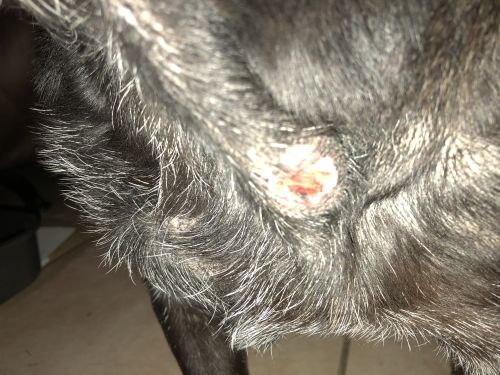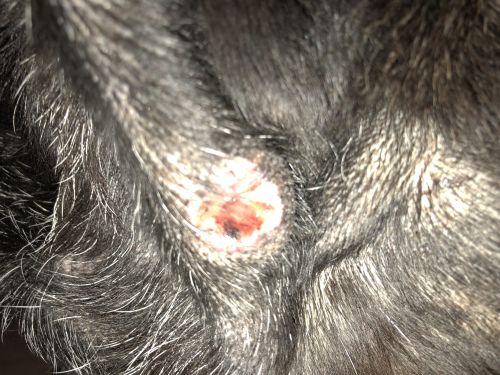Dogs and MRSA
(Seattle, Wa Usa)
01/25/2010
I have been in the hospital many times from having staph/mrsa infections and I'm a very clean person and I keep my scrapes and cuts clean as well. I have been treated for mrsa every time but the infection has come back. I was told to cure my dog of MRSA because she could be colonizing it and that could be why I keep getting the MRSA infections. I am desperate for a cure so if anyone has any good advice please let me know. One thing I found out recently is that here in the Puget Sound waters there has been tests done and they found MRSA in the waters. I have not brought my dog to the beaches and since then I have not had any MRSA infections. I still want to cure her though just in case. When I call the doctors and let them know I want to do a MRSA treatment on my pet the people at the vet clinics have acted like they have not come across these kinds of issues before. Kind of shocking huh? Any ideas?
I read somewhere that Turmeric can kill MRSA. Make a paste with water and paste it on the infection. Not sure what to do if its internal. Just make sure that its a good quality with 95% curcumin..
(Philadelphia, Pa)
02/05/2010
(Seattle, Washington State)
03/13/2010
I HAVE NOT YET FOUND A VET THAT DOES MRSA TREATMENT. I HOWEVER HAVE HAD MRSA SO IF YOU NOTICE YOUR DOG DOES THEN I WOULD CALL AROUND BEFORE PICKING A VET CLINIC AND SEEING IF THEY TREAT DOGS OR CATS WITH MRSA. IM SURE THEY WILL GIVE YOU A BIG BILL. DOES YOUR DOG HAVE SYMPTOMS OF MRSA? HERE IN THE PUGET SOUND IN WASHINGTON STATE, THERE HAS BEEN TRACES OF MRSA FOUND ON THE BEACHES AND IN THE WATER. SINCE I HAVE STOPPED GOING TO THE BEACHES HERE AND TAKING MY DOG THERE FOR A SWIM, I HAVE NOT HAD ANY MRSA OR AWFUL STAPH INFECTIONS. I THINK THATS WHY I WAS GETTING THEM WAS FROM THE PUGET SOUND WATER.
(Illinois)
01/13/2015
Our dog is currently being treated by a vet for MRSA. She did a culture to discover which antibiotics would work. We take him every morning and leave him at the vets while we're at work. He gets 2 drops twice a day in his ear that is infected with MRSA. We will see if it works now that we know the problem.
(Cancun, México)
01/15/2025
Manuka honey beats MRSA.
Ted's Remedies
What can I use instead of H202 and still get results? Hope to hear from you. He is very itchy and his tail was bleeding. That is where mites and bacteria seem to persist.
Namaste, Om
(Mpls., Mn)
03/07/2015
Namaste Om!
Ted provided an alternate for the peroxide which I believe was vinegar; it was in the feedback before they changed up the format and now I cannot search it for the life of me.
You could try equal parts Milk of magnesia, Borax and Epsom salt and vinegar or plain water - think 1 tablespoon of the borax etc., and 1 to 1-1/2 cup of water/vinegar. The parasite and yeast killers are the borax, epsom salt and milk of magnesia - the hydrogen peroxide acts as a penetrant, and vinegar will do similar, but not as effective as the hydrogen peroxide.
I hope Big Dog heals soon! Mine are now experiencing yeasty spots in the wrinkles so I am on baking soda water and may change it up to borax water after. Something is triggering the outbreaks and then what complicates it is the inflamation and itching. This is where the colostrum and quercetin comes in, along with possibly yucca to address the inflamation in place of steriods. The turmeric may do this also, but some remedies are indicated over others .. just because. So much tinkering to find out what works - for now, as it may not work tomorrow when the winds blow in new allergens.
(Mpls., Mn)
03/09/2015
Namaste, Om!
I found this response from Gary back in 2007 re: substitutions for hydrogen peroxide.
Posted by Garry (RI) on 01/08/2007
[YEA] Saw the responses to your treatments and I gave him two dips with the peroxide / borax the first couple of weeks and then switched to a 50 / 50 water / white vinegar / borax dip ever since. I used white instead of ACV because it's cheaper and it seems that it's the acetic acid that is the carrier into the skin. ALL of his hair is back and he hardly scratches anymore. He gets the recommended borax in the the drinking water too. I intend to give him maintenance dips once every month or so and may continue with the Borax in the drinking water as an ongoing thing. Great advice! Thanks again!
- See more at: https://www.earthclinic.com/pets/dog_mange_cure21.html#sthash.I6g0fLC9.dpuf
(Hope, Bc, Canada)
03/09/2015
Turmeric
Thank you everybody for your input!


(Tn)
03/20/2018
Dear Dorothy,
I have used turmeric for my dogs internally and externally.
I would give a 20 pound dog 1/4 teaspoon 3 times a day for infection.
For the wound, you could try mixing raw honey and turmeric to pack the wound. Both will fight a variety of infections, including MRSA. I have used this on people and wouldn't hesitate to use it on a dog. Maybe mix 1/2 teaspoon turmeric into each Tablespoon of honey.
~Mama to Many~
(Mpls., Mn)
03/20/2018
Hello Dorothy,
This sounds like a cyst or tumour. A poultice of turmeric or turmeric and castor oil may help. Certainly turmeric can be sprinkled on the food for its tumor fighting benefits as well. You should be able to call your vet before hand and ask if they will culture it to find out what type of bacteria you are dealing with so as to have the most effective antibiotic prescribed should you go that route.
I have a dog that had a very large cyst that burst and afterward it looked similar to your picture. I have a post under Blackstrap Molasses, Turmeric where you can read what I did. He healed and hasn't had any problems since. I tried to post a picture but can't seem to do it from here, would have to start a new post.


